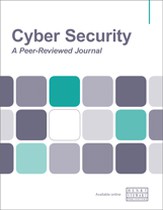International principles for boards of directors and cyber security
Abstract
As threats emanating from poor cyber security have grown, calls for boards of directors to become more involved as have also grown. The exact role of the board, as opposed to management, in this new field has been murky, however, and effective steps at the board level have not previously been clearly defined. The Internet Security Alliance (ISA), in conjunction with organisations representing corporate board members and governments on four continents, conducted grounded research involving hundreds of directors, senior management government and academic responders. The ISA research generated a series of open source cyber risk handbooks. The handbooks articulated a common set of five core principles and practical steps to implement them. This paper discusses these principles, which include items boards need to be aware of in their own operations, as well as delineating the board’s role in setting expectations for management. Although the core principles were supported by all participating organisations, adaptations were required to reflect differences in culture, board structure and law. The principles depart in significant ways from many commonly held assumptions about addressing cyber risk. For example, the very first principle is that boards need to conceptualise cyber security not as an ‘IT issue’ but as a broader risk management issue. Other principles urge boards to understand their unique legal obligations and access appropriate expertise. Boards are also urged to consider restructuring their cyber security management teams away from their current IT focus and urge management to adopt new cyber risk assessment techniques conceptualising cyber risk in empirical and economic terms. Although not part of the ISA research, the paper reports on an independent assessment PwC conducted on use of the handbooks. PwC’s ‘Global Information Security Survey’ reported use of the handbooks generated higher budgets, better risk management, closer alignment between cyber security and business goals and helped generate a culture of security
The full article is available to subscribers to the journal.
Author's Biography
Larry Clinton is president of the Internet Security Alliance (ISA), a multi-sector association focused on cyber security thought leadership, policy advocacy and best practices. In addition to teaching master classes for NACD, Larry teaches a graduate course on cyber security at the Wharton School and trains the staff of the Federal Reserve Bank on cyber. He is the former chair of the IT Sector Coordinating Council and advises the Center for Audit Quality on cyber issues. He has been a featured spokesman in virtually all major media outlets, testifies often before US Congress and has briefed NATO. Larry is author of the Cyber Security Social Contract which was the basis for President Obama’s Executive Order and endorsed by the House GOP a task force on cyber security. He is the principal author of the NACD Director’s Handbook on Cyber-Risk Oversight and has twice been named to NACD’s Corporate 100.
